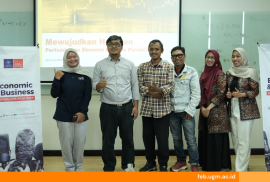The Microeconomics Dashboard (Micdash) team at the Faculty of Economics and Business (FEB) UGM has researched Indonesia’s demographic transition. The study reveals that Indonesia is entering the first phase of the demographic dividend era. Although there have been improvements in leveraging this demographic dividend, several challenges remain. The demographic dividend refers to the economic benefits of changes in a country’s age structure.
Qisha Quarina, S.E., M.Sc., Ph.D., a coordinator and lecturer at FEB UGM, explained that improvements are particularly evident in human capital investments, such as the increase in the Human Development Index (HDI) and school participation rates. Additionally, the proportion of savings to GDP has also risen.
However, Qisha noted that while human capital investment has improved, some indicators have stagnated or remain low. These include the labor force participation rate for women, low productivity and earnings of workers, and low savings and asset ownership among older people. “These conditions still pose challenges for Indonesia to harness the demographic dividend fully,” she said on Wednesday (28/5).
Qisha underscores the pivotal role of policymakers in this context. She stresses that they need to prioritize the identified issues to ensure that the opportunity to reap the demographic dividend does not become a demographic burden. This condition is especially crucial during the projected window of opportunity from 2020-2035. “This opportunity is time-limited and will occur only once in the history of Indonesia,” she adds, highlighting the urgency and importance of their actions.
Qisha pointed out that the demographic dividend does not happen automatically or for free. Demographic dividends need specific prerequisites to prevent the demographic structure from becoming a burden. “There are three mechanisms to leverage the demographic dividend: labor supply, human capital, and savings,” she explained.
Raniah Salsabila, S.E., another Micdash researcher, added that Indonesia’s demographic transition, marked by declining birth and death rates, has altered the age structure. This transition has brought Indonesia into the first phase of the demographic dividend, indicated by a dependency ratio below 50% since 2015. This condition suggests that people of productive age dominate Indonesia’s population.
Raniah points out a critical aspect of the demographic dividend: its time-limited nature. The dependency ratio in Indonesia is projected to rise again after 2035, surpassing 50% by 2045 due to an aging population. This period will mark the end of the first phase of the demographic dividend, characterized by an increase in the elderly population. As the elderly tend to have reduced physical capacity and increased health issues, they become less productive and dependent on others or the government. Therefore, the government needs to prepare and maintain active and productive elderly populations to fully benefit from the demographic dividend.
Source: Micdash
Editor: Kurnia Ekaptiningrum
IKU: 5
Sustainable Development Goals








